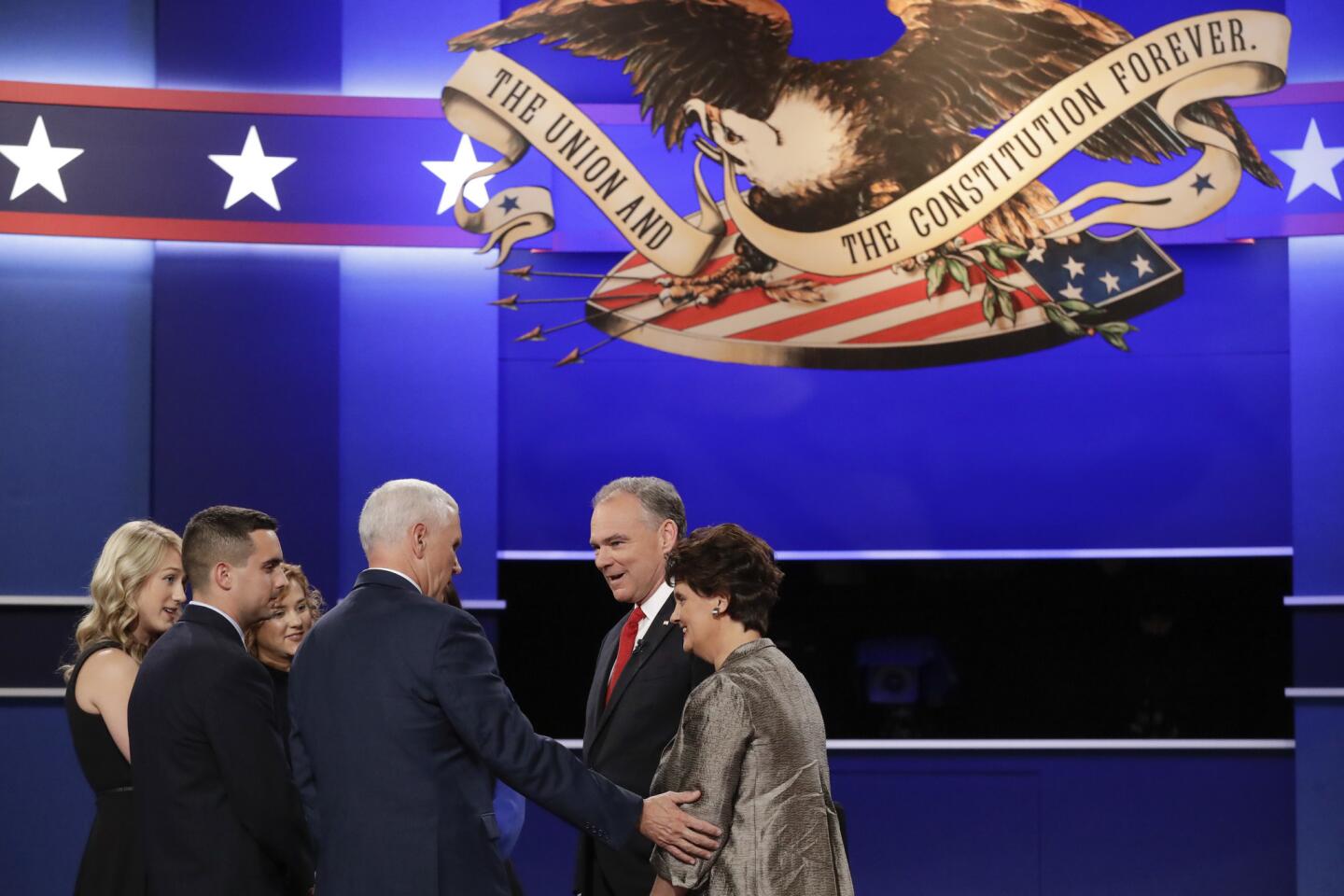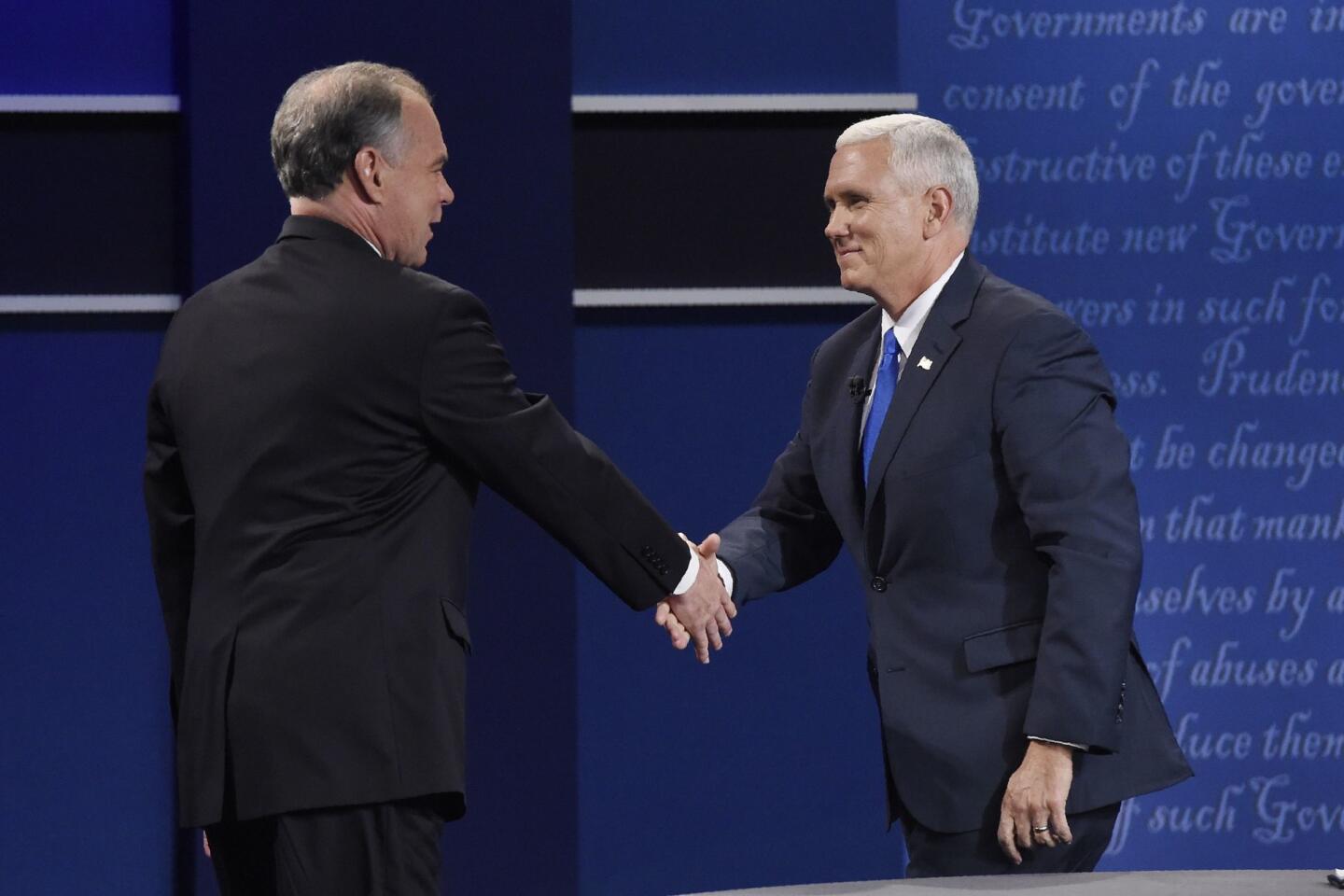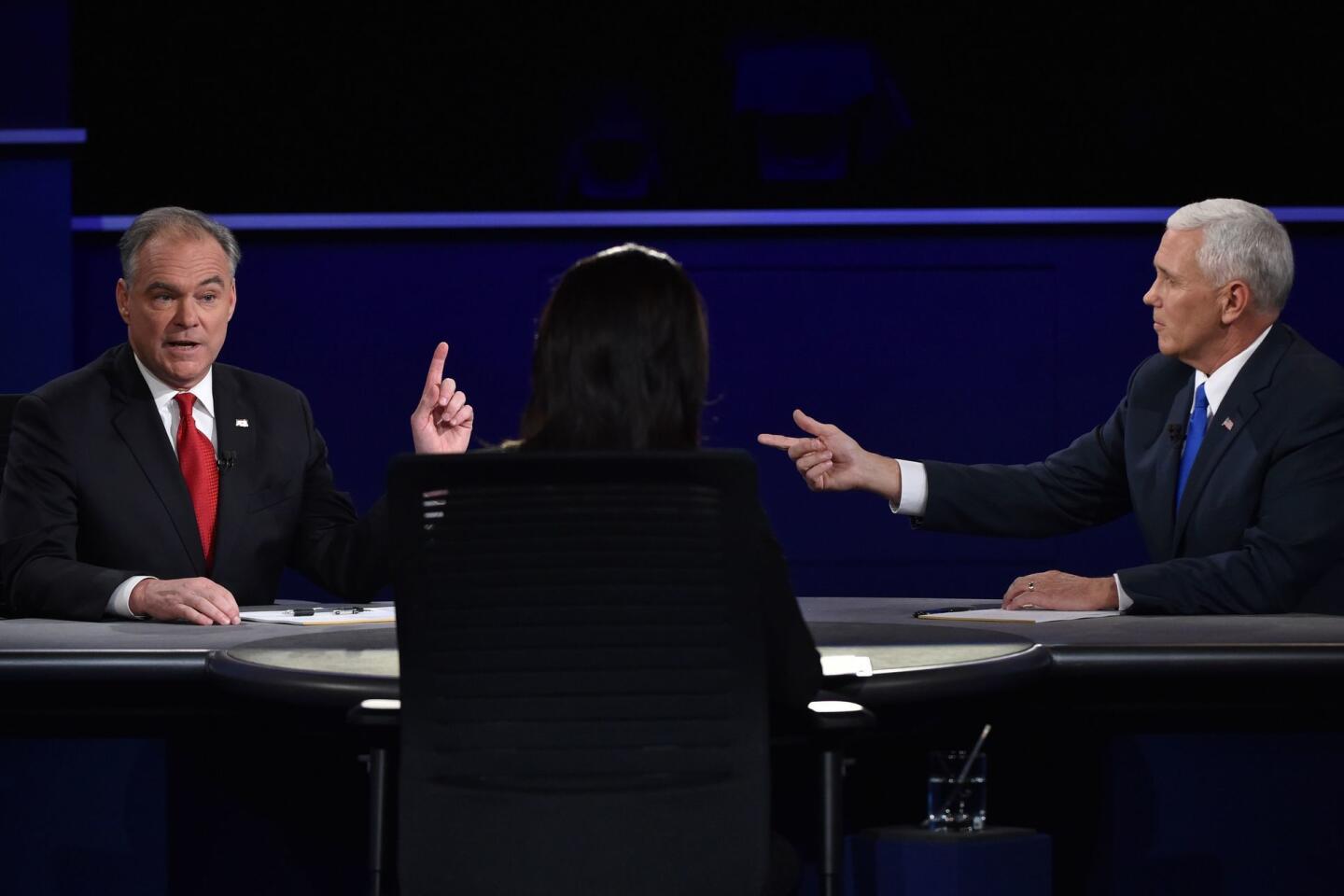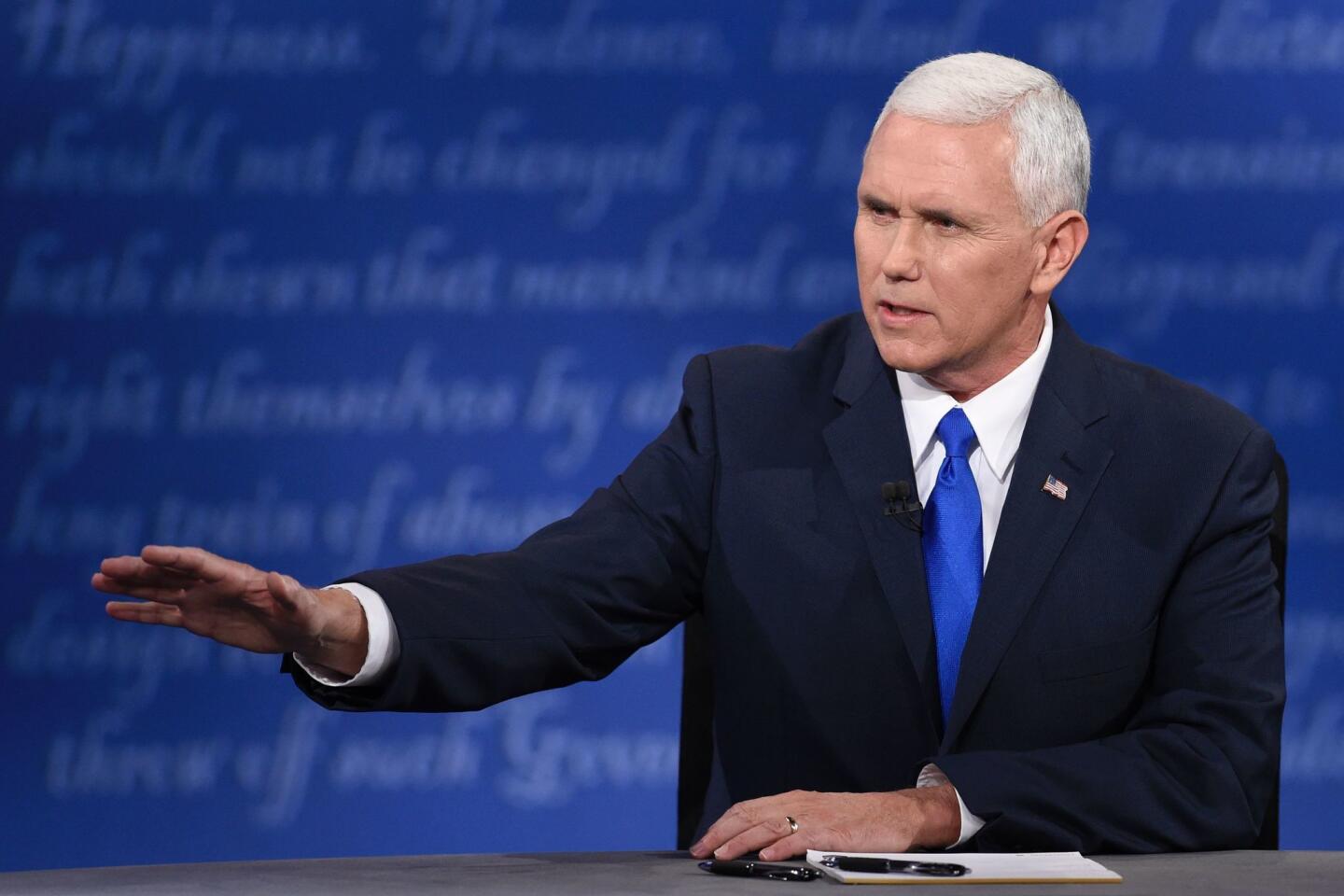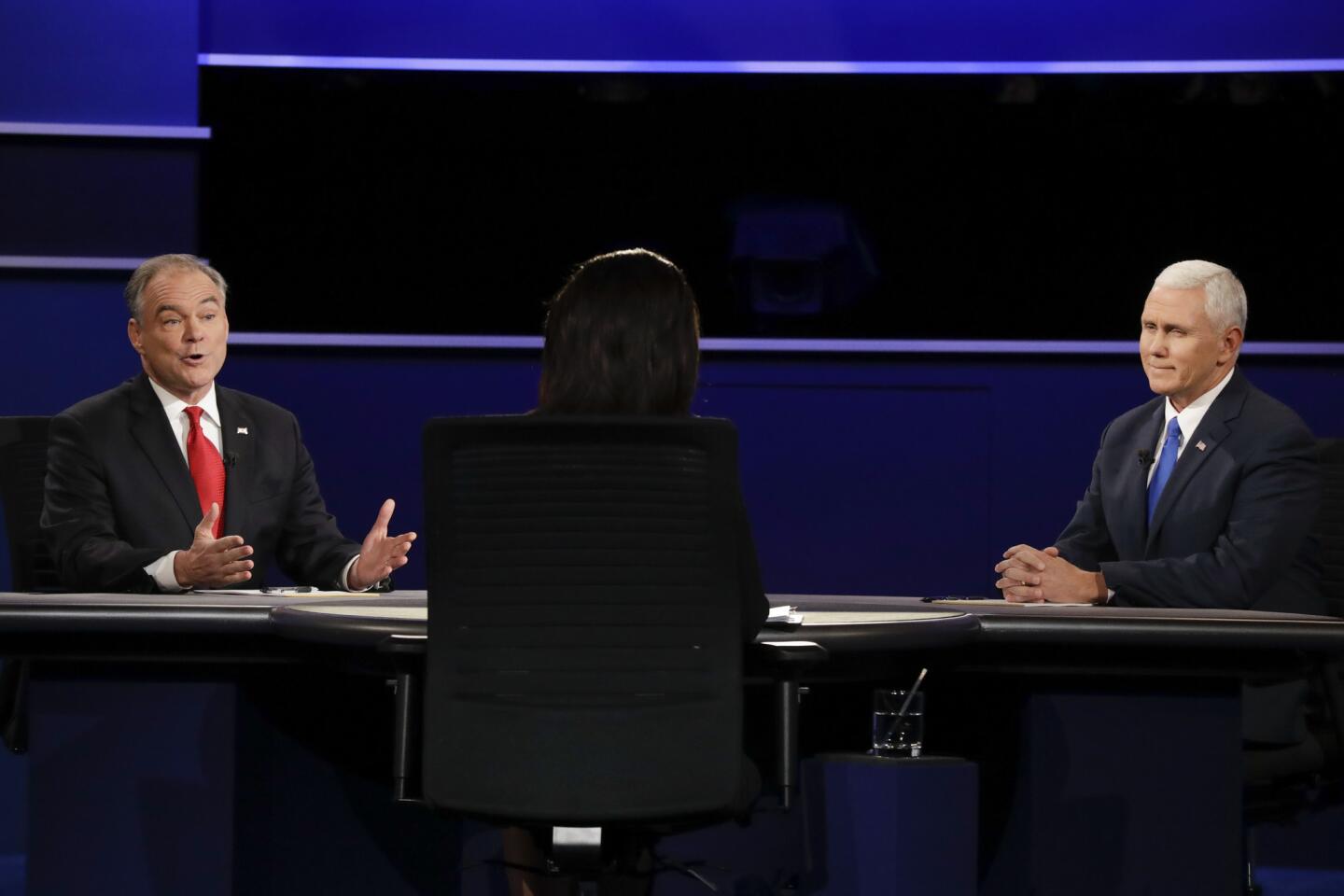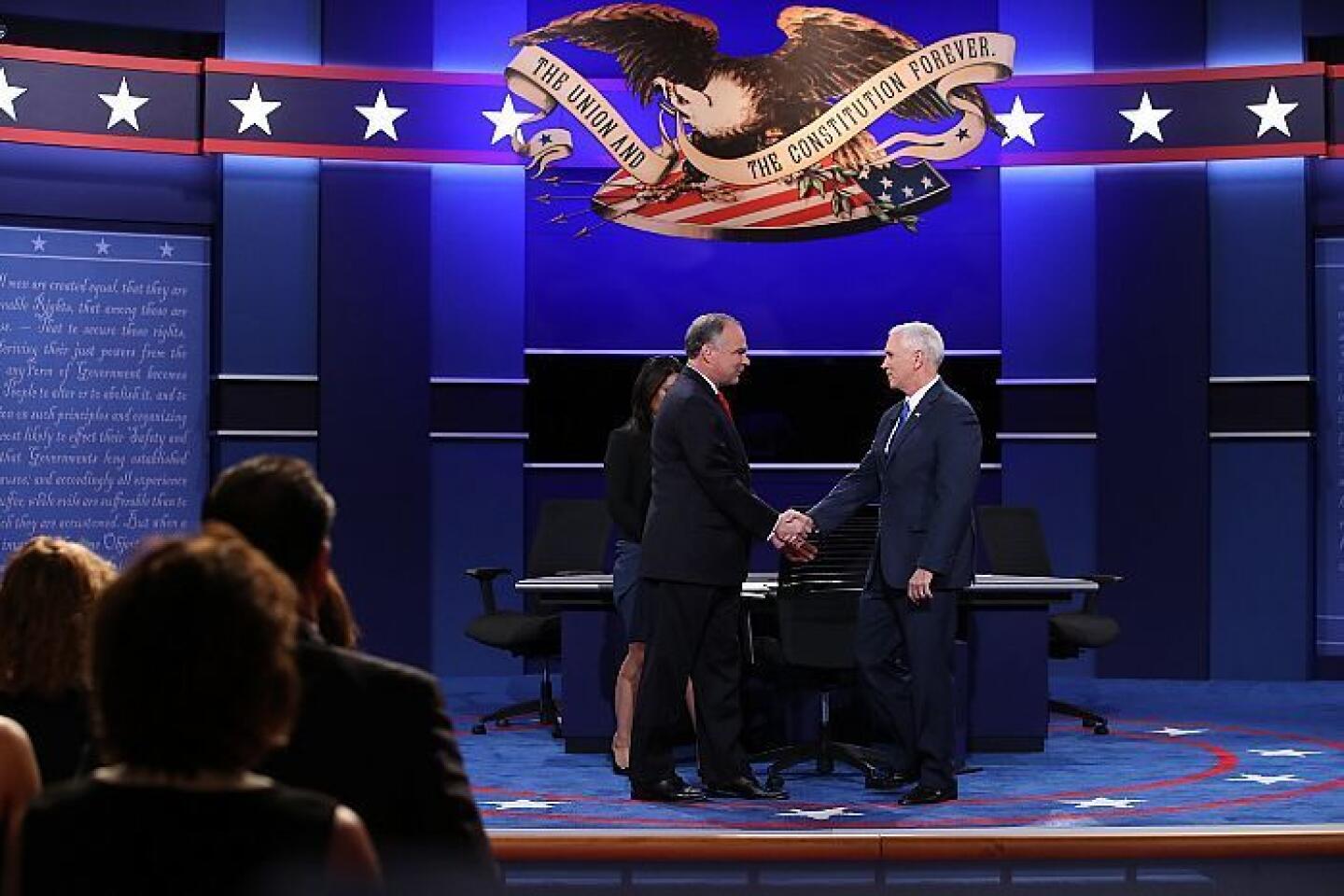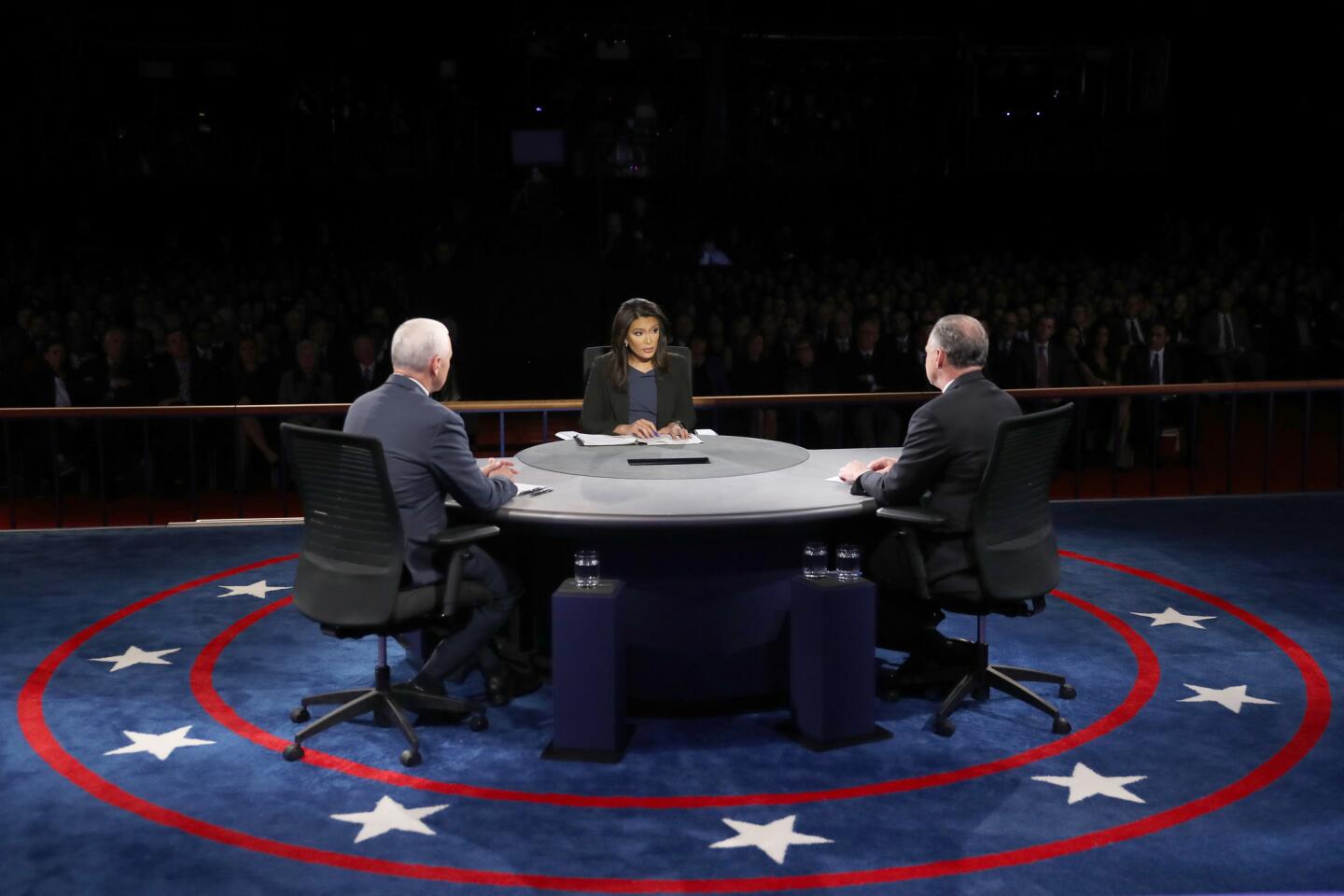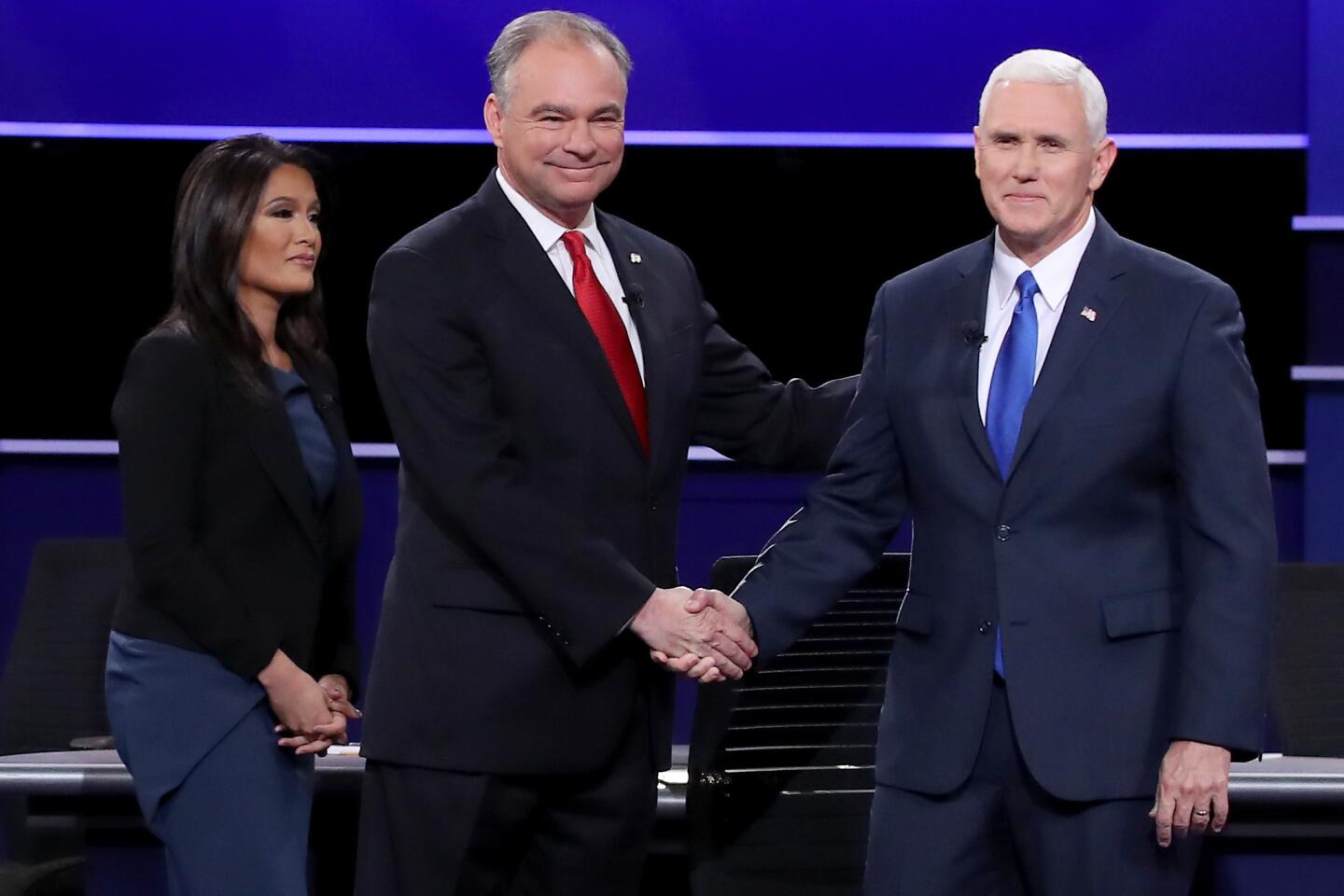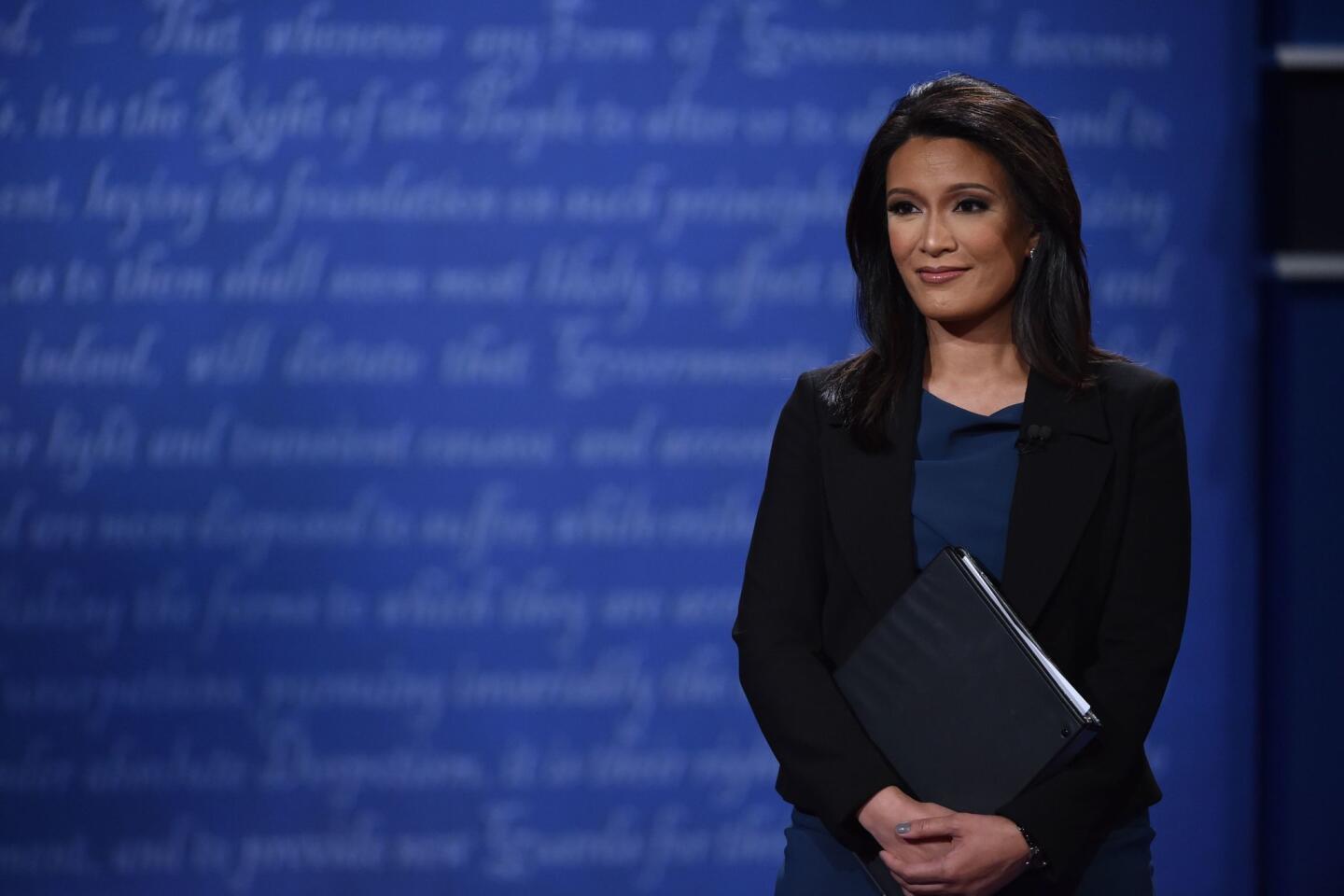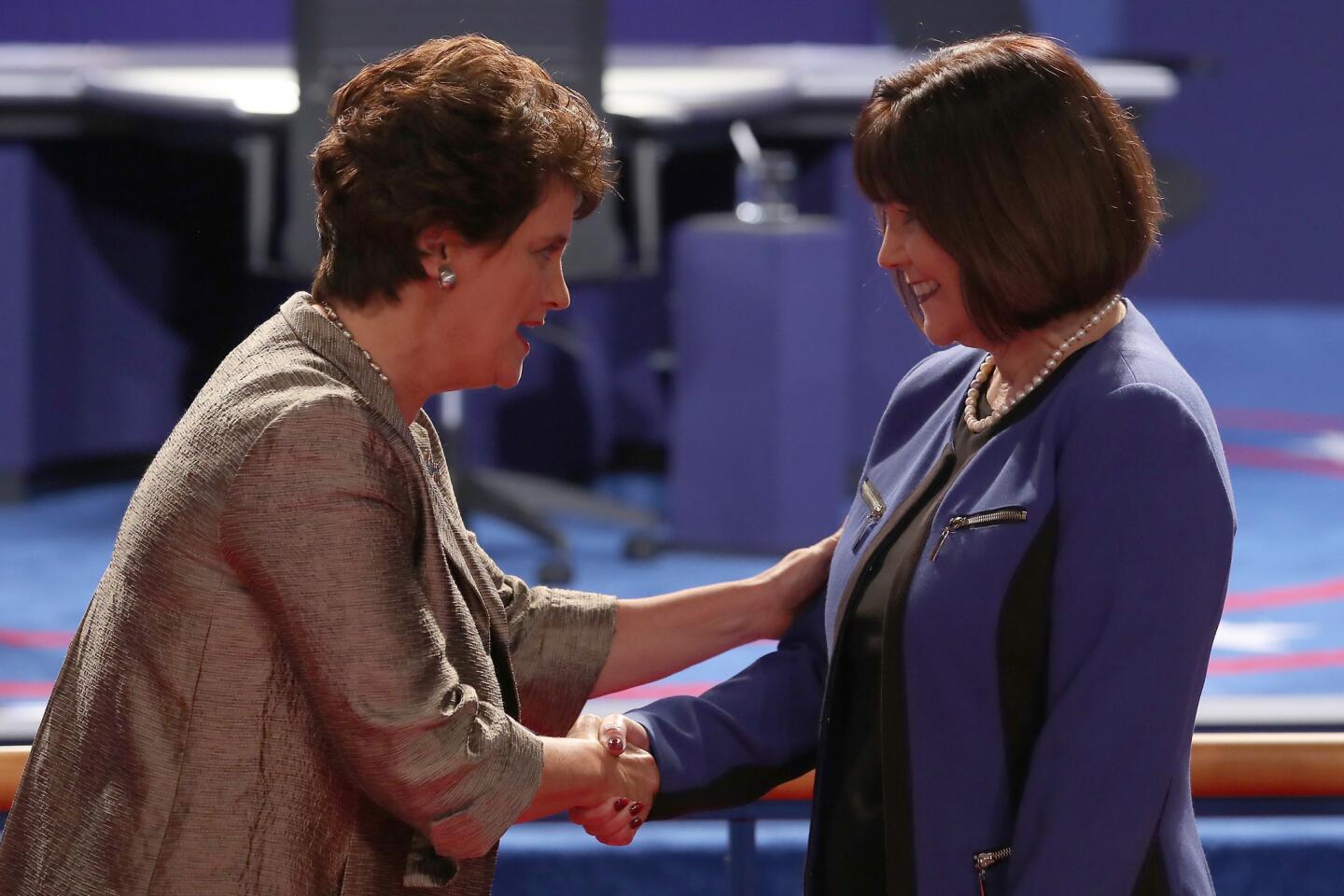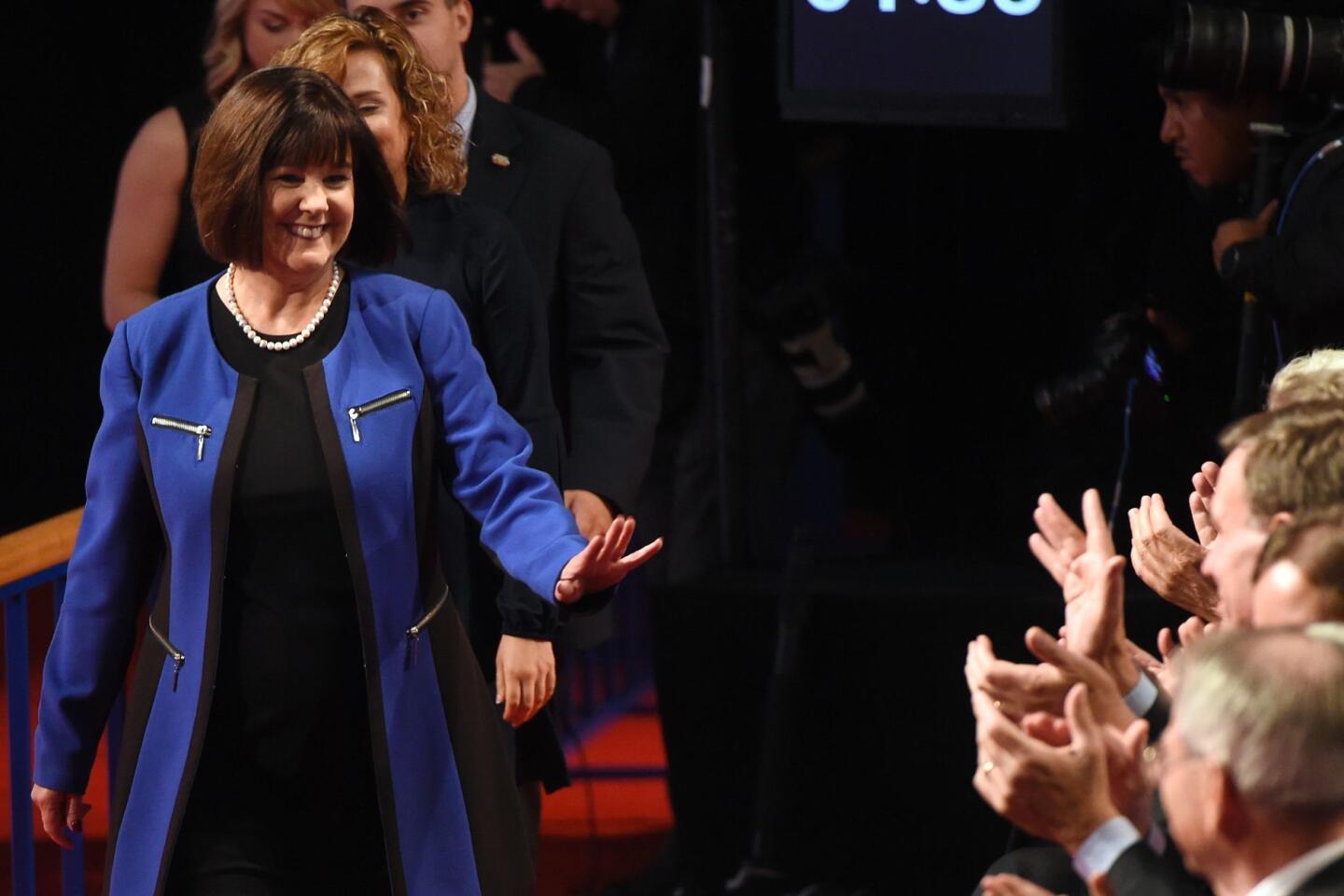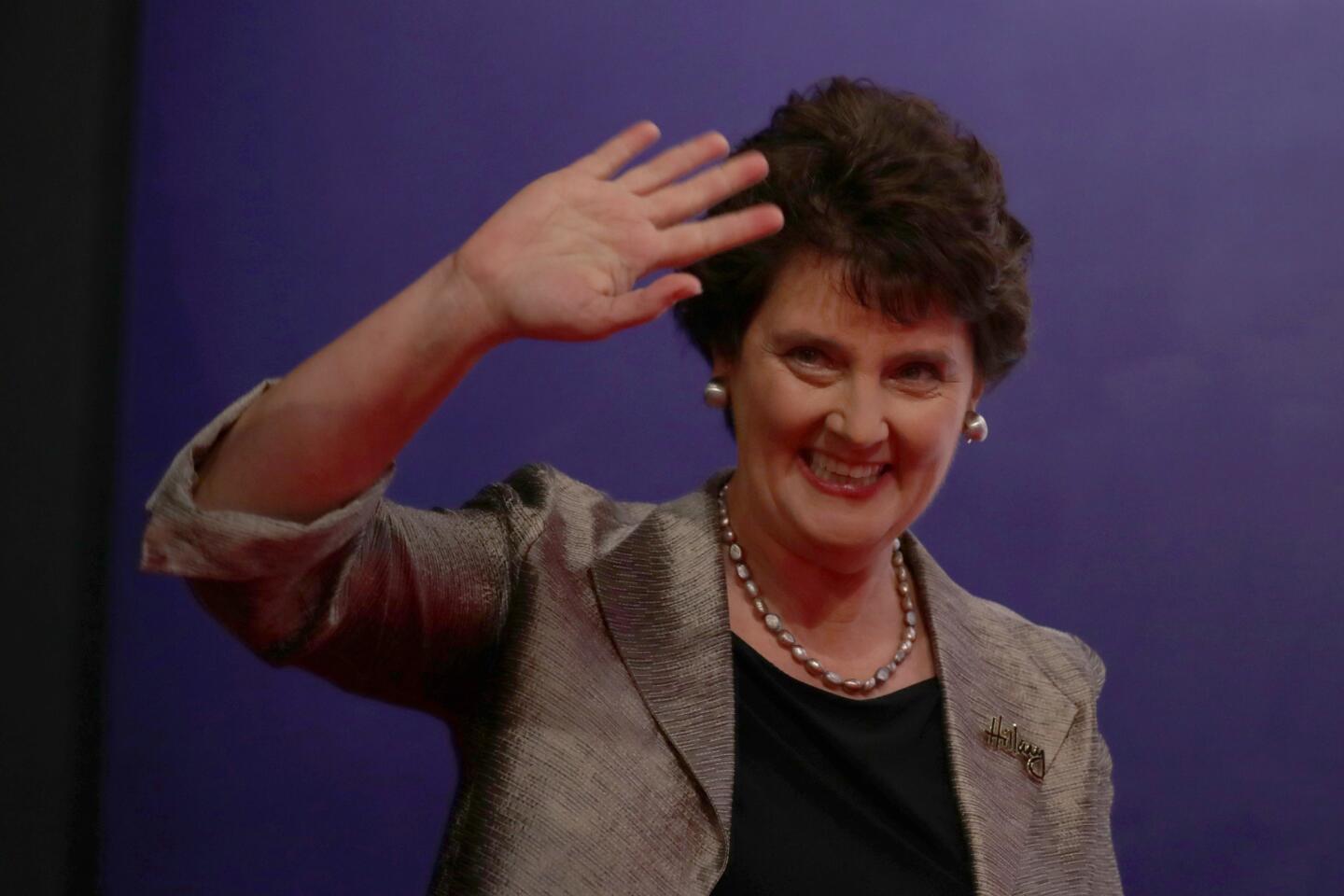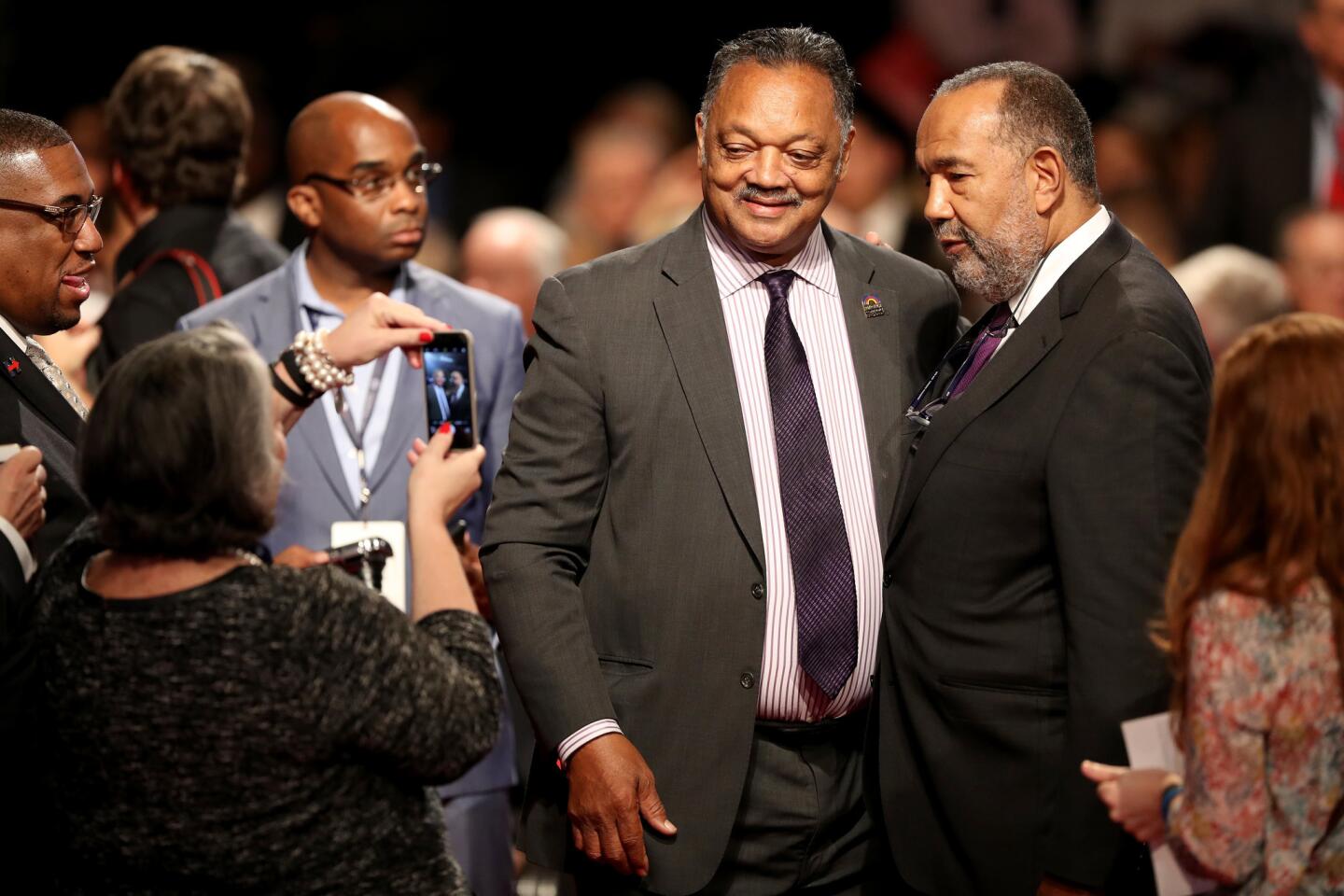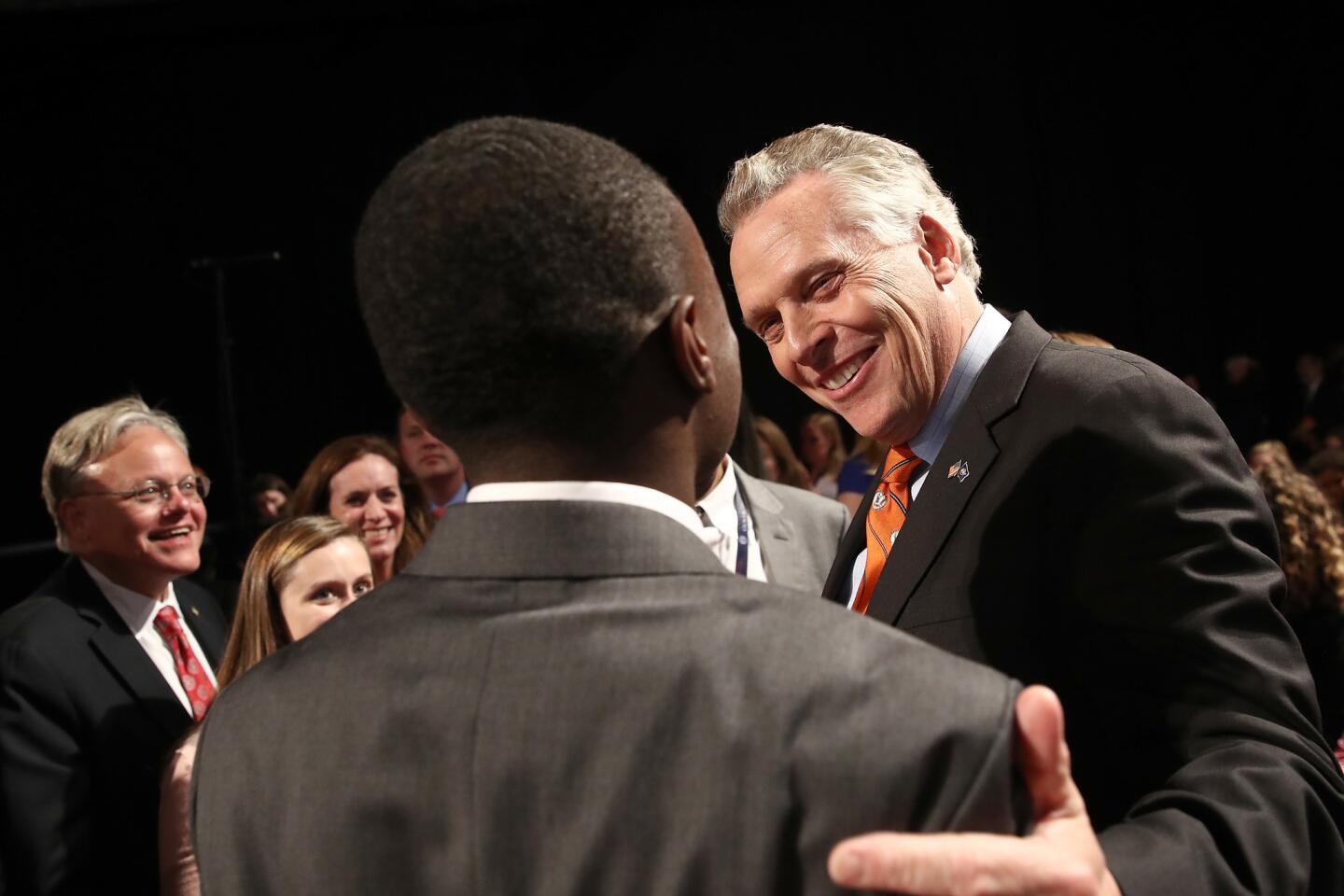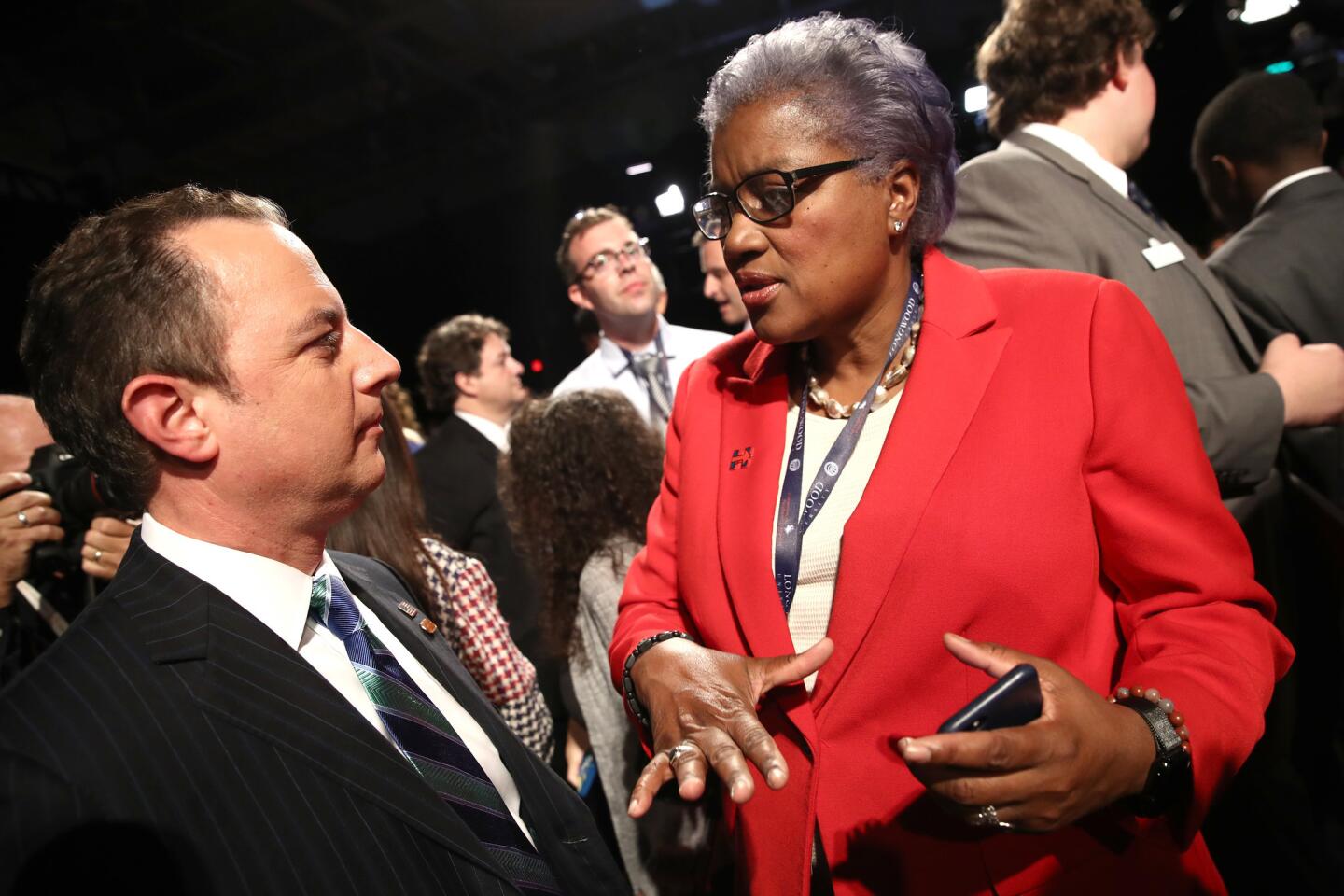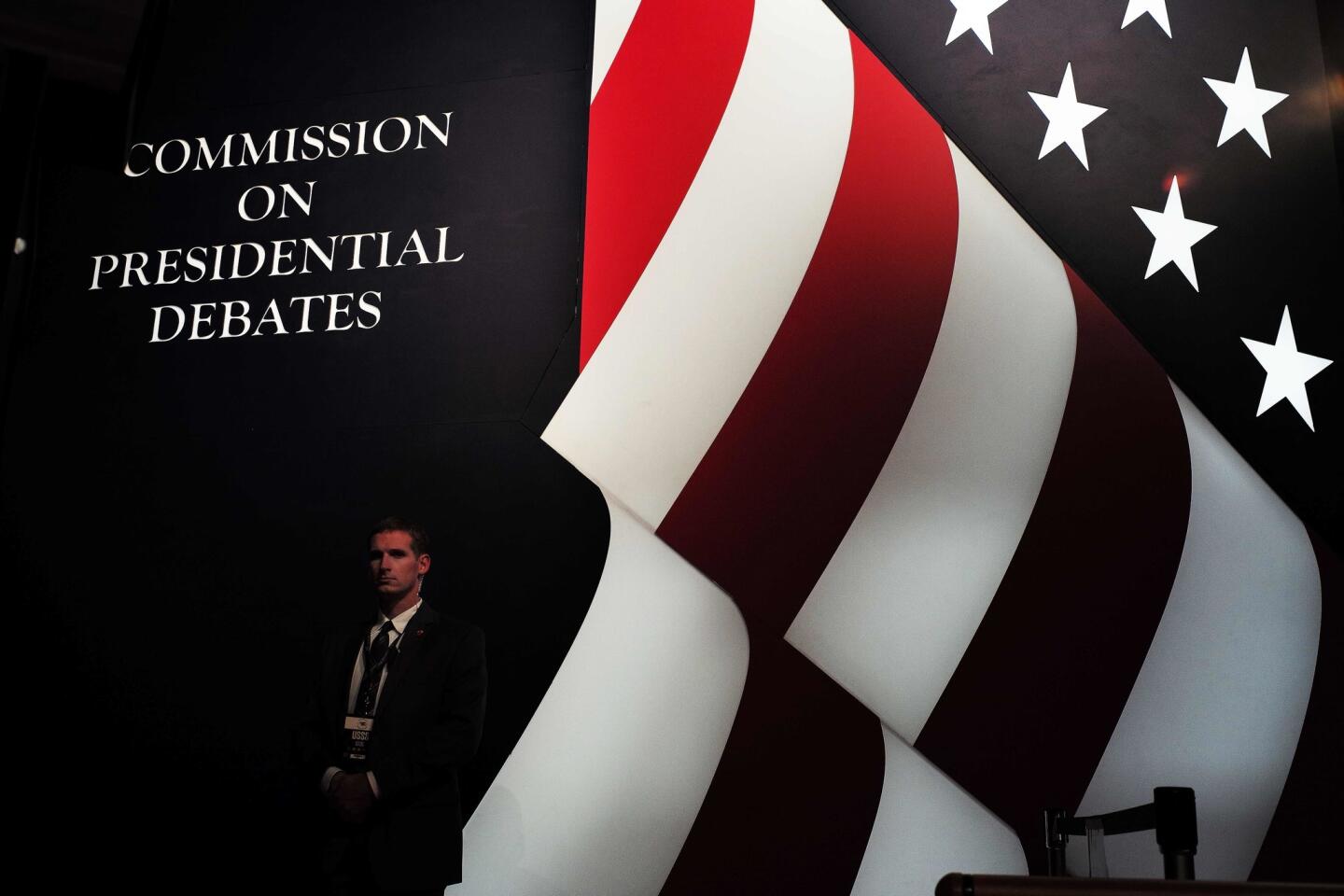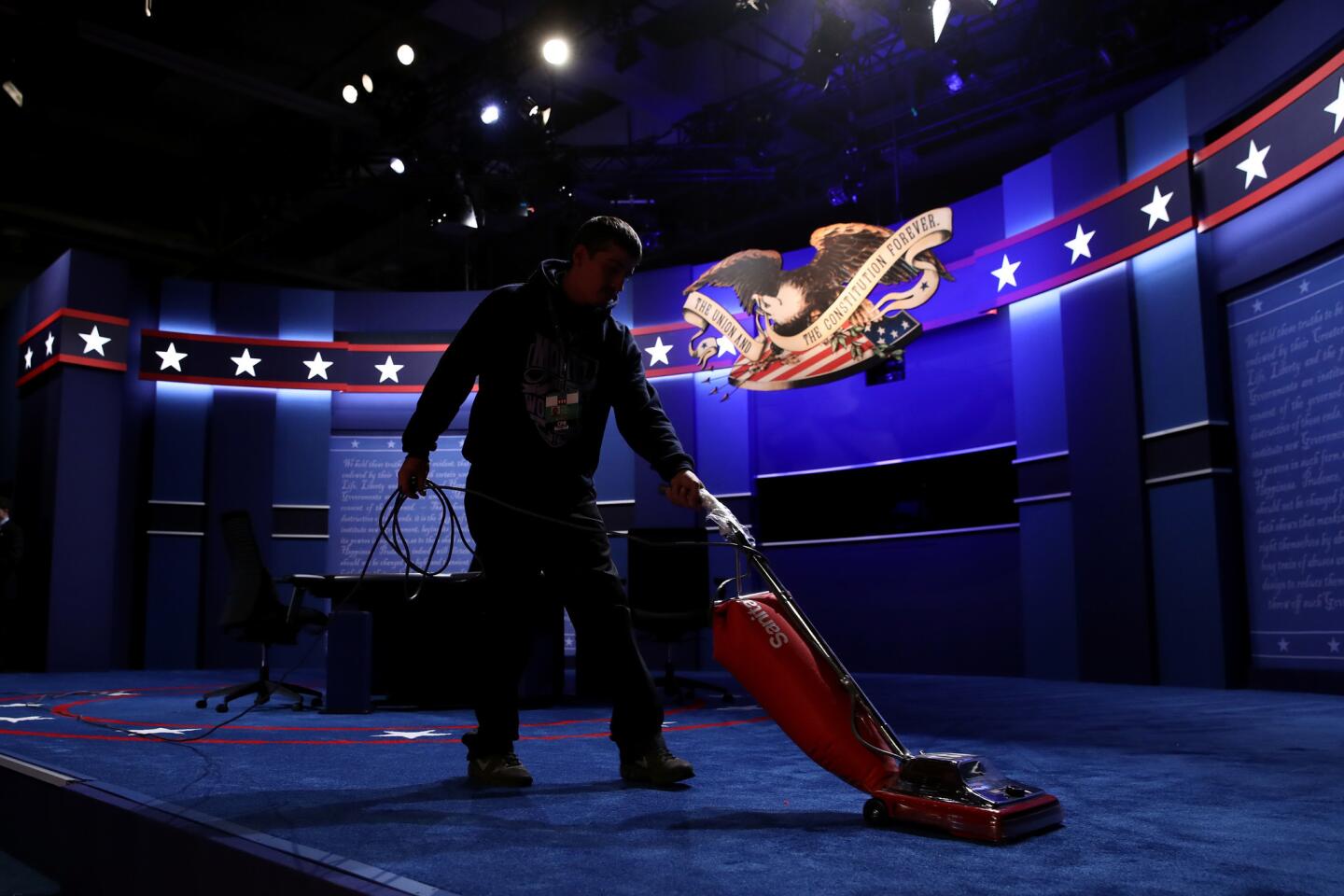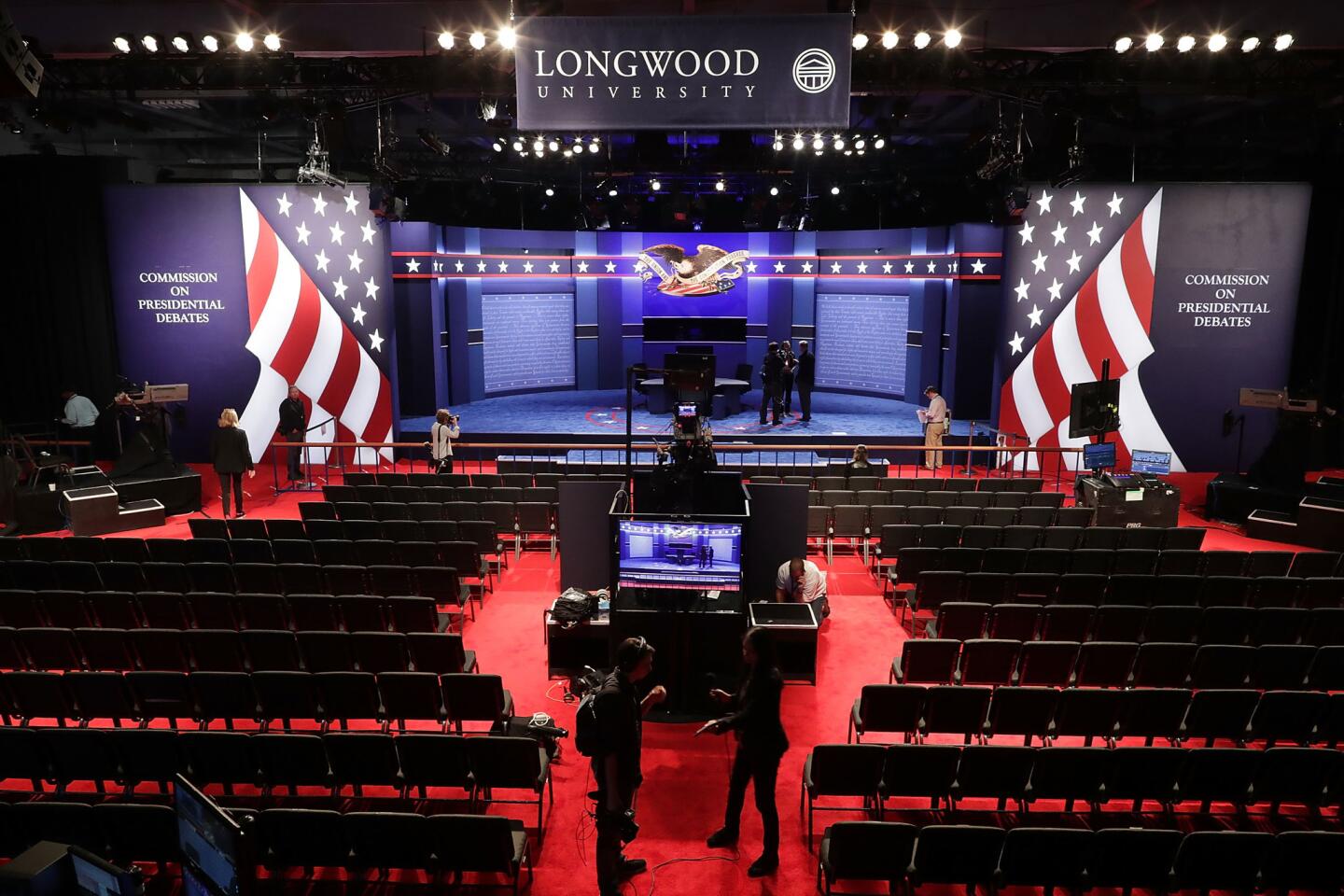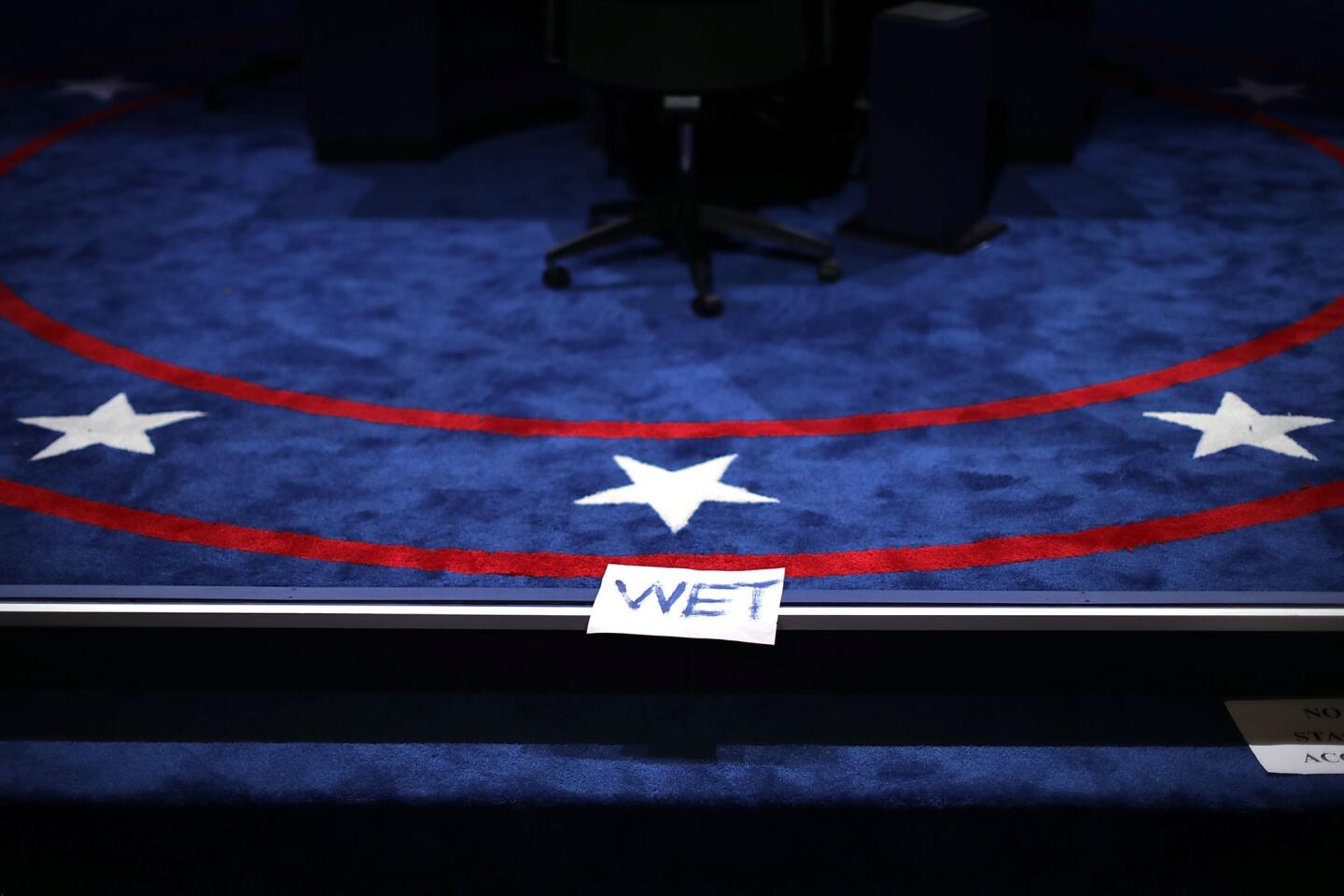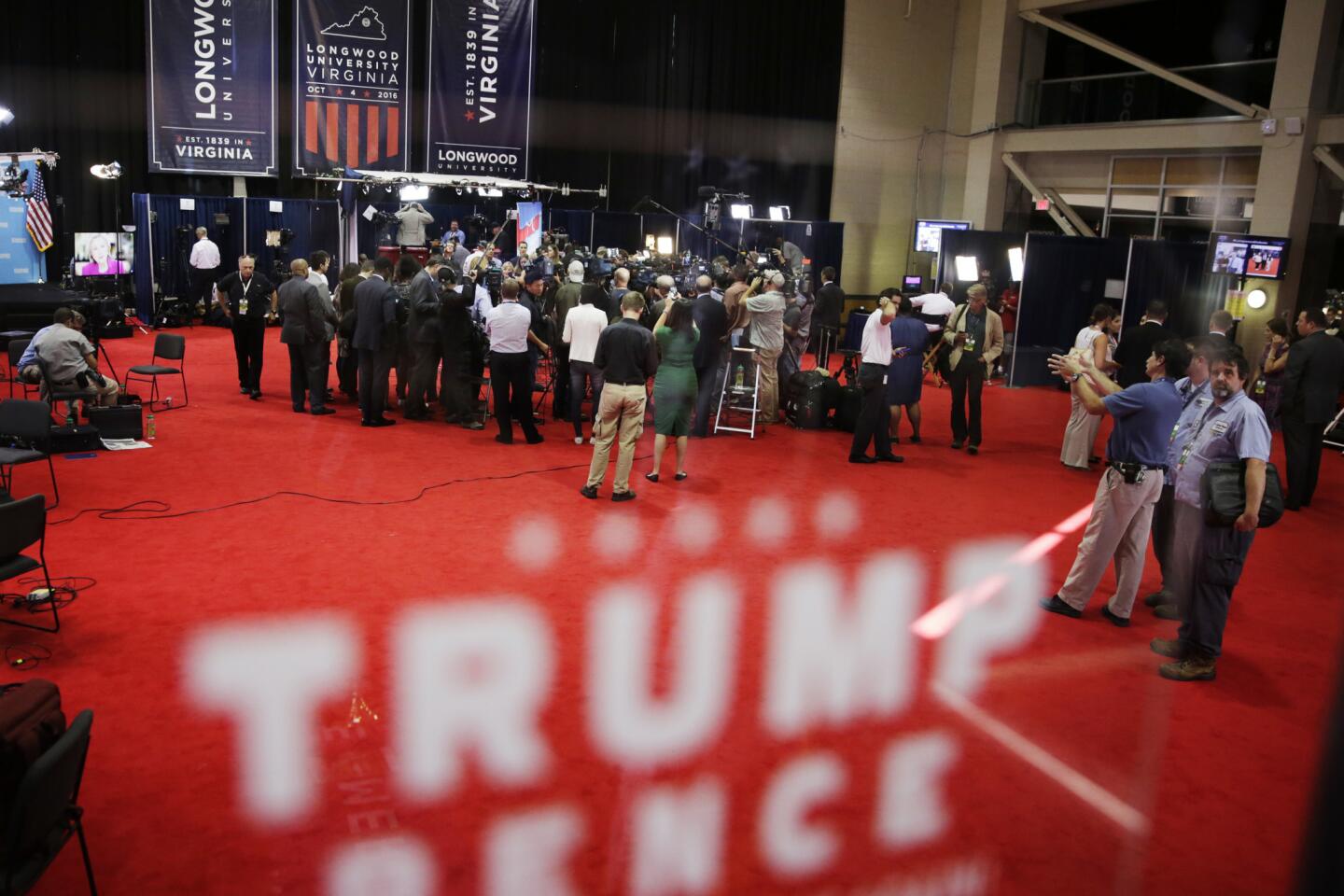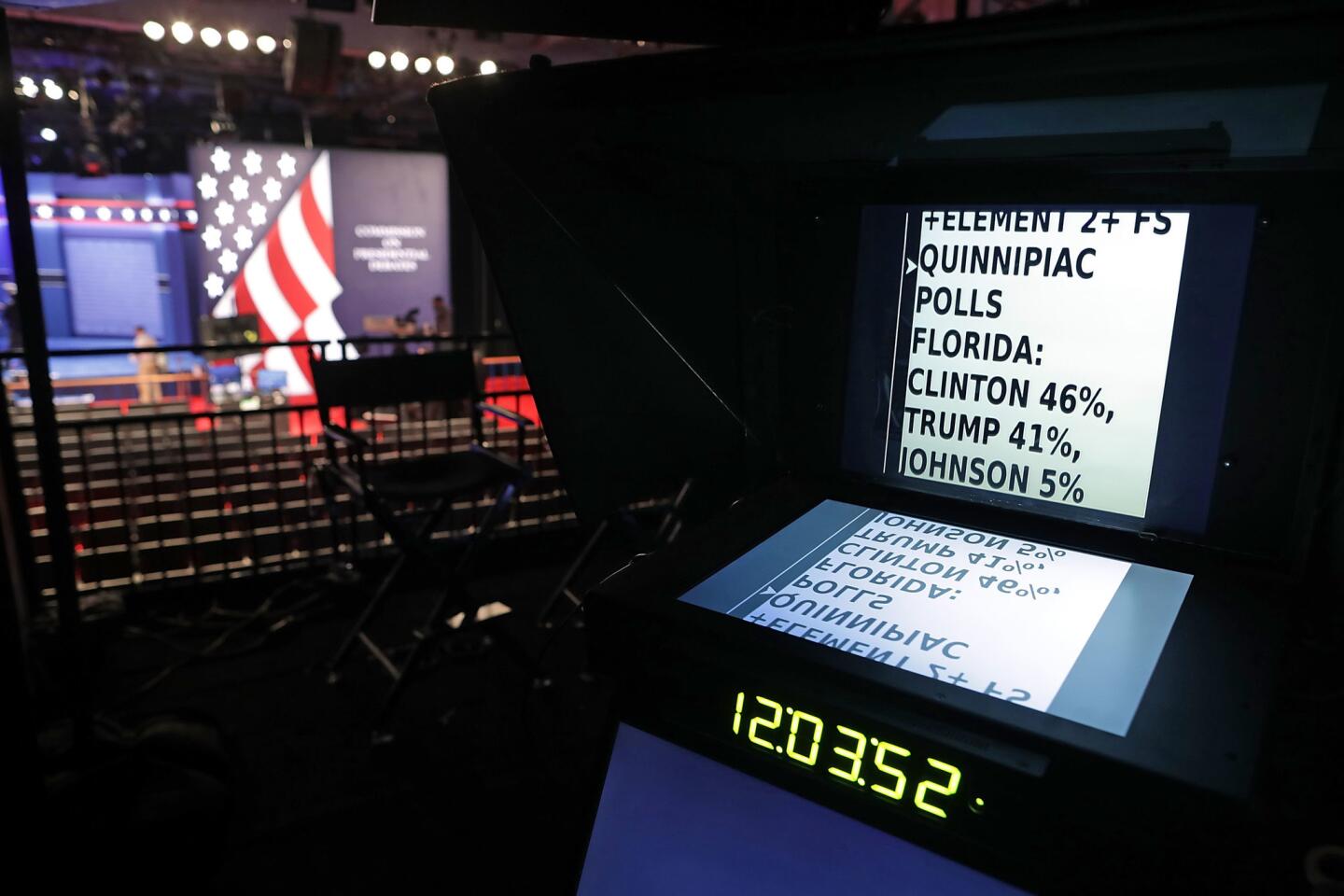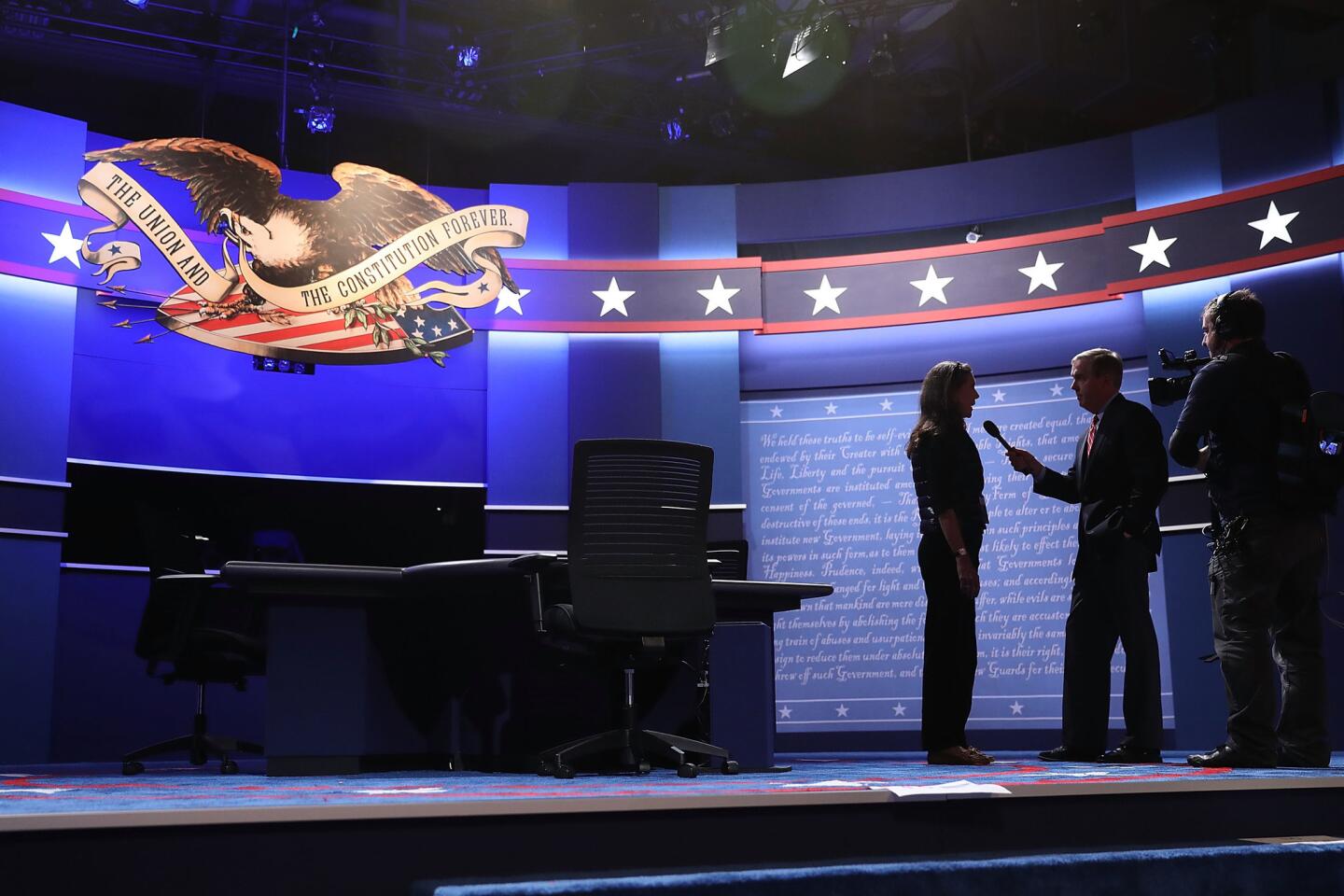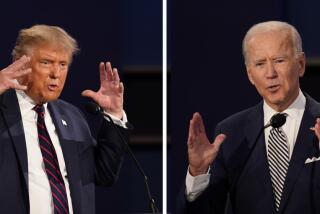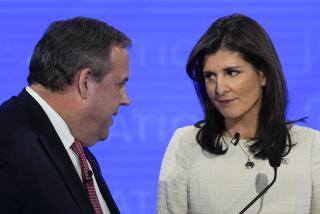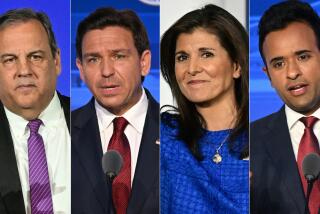Analysis: Vice presidential candidates bicker to little effect on presidential race
With the measured tones of a former radio host and the policy chops of a veteran politician, Mike Pence in Tuesday night’s vice presidential debate delivered the performance Donald Trump failed to achieve in his recent meeting with Hillary Clinton.
The Indiana governor ticked off specific points central to the Republican ticket’s plans for Washington. He smoothly, and without a hint of embarrassment, denied that Trump had said things Trump had said. And yet he repeatedly declined to attach himself too closely to Trump’s policies and priorities.
In the end it was hard to know: How much was this debate performance meant to arrest the Trump campaign’s weeklong slide? And how much was it the first blush of Pence’s own run for president in 2020?
The performance of Democratic vice presidential nominee Tim Kaine was less ambiguous. A man known for a gee-whiz affability, he flirted with obnoxiousness by repeatedly interrupting both Pence and the moderator. But in the process, the Virginia senator landed more than a few blows.
Video playlist: The Trump Transition
Over and over, he called attention to the worst moments of Trump’s campaign — including the businessman’s coarse comments about women and Latino immigrants and a Mexican American judge overseeing a lawsuit involving one of his business ventures, as well as Sen. John McCain’s capture during the Vietnam War — and his refusal to apologize for any of it. Over and over, Kaine asked Pence how he could justify Trump’s behavior.
Pence often had no reply other than to shake his head.
If the night seemed to go narrowly to Pence, it also is more than likely to have no impact on the presidential contest.
The two vice presidential candidates had their 90 minutes onstage Tuesday, and henceforth will be where they have been since summer, in the shadow of two dominant personalities engaged in a fierce fight for the White House.
That shadow will only deepen on Sunday, when the two presidential candidates gather for their second debate, this time at Washington University in St. Louis.
As for the vice presidential candidates, this was their only meeting — and they spent it bickering and interrupting and walking all over moderator Elaine Quijano, who repeatedly interjected, “Gentlemen, please!”
The behavior during the 90-minute session at Longwood University in Virginia was all the more surprising because Kaine and Pence entered the ring as the mollifiers of the campaign. Pence has served in the last several months as Trump’s explainer in chief, telling voters what Trump meant to say when the presidential nominee has created a mess.
He did that again Tuesday when he sought to excuse Trump’s comment that women who receive abortions should be punished.
First Pence denied that Trump had made the comment — Trump did, in a well-publicized interview with MSNBC’s Chris Matthews — and then he offered his running mate an excuse: “Look, he’s not a polished politician like you and Hillary Clinton.”
Pence, with what seemed an eye to his future, didn’t break character. He rarely raised his voice. When he wanted to make a point that Kaine was exaggerating — even when he wasn’t — he adopted the sorrowful look of a disappointed parent.
Kaine seemed more willing to consign his reputation to the attack-dog demands of the vice presidential position. But that tactic was often jarring and drew attention more to his over-caffeinated style than to the content of his statements.
Under all the nasty back-and-forth, however, the debate did provide a healthy comparison of the two tickets.
More than in the presidential debate, the two dove into weeds of policy. In the presidential debate, Clinton had done that, but Trump almost completely declined to elaborate on the details of his plans.
It was on the topic of Russia that Pence seemed to distance himself most from Trump. He castigated Clinton and President Obama as weaklings on the world stage, unwilling to stand up to Russian leader Vladimir Putin.
Putin has, of course, come in for repeated praise from Trump, which Pence ignored as he pressed a more traditionally Republican line of foreign policy thinking.
“When Donald Trump becomes president, the Russians and other countries in the world will know they are dealing with a strong American president,” he said.
Kaine referred to claims from Pence and Trump that Putin was a better leader than Obama.
“If you don’t know the difference between dictatorship and leadership, then you got to go back to a fifth-grade civics class,” he said.
Ultimately, voters’ reaction to the debate may rest in part on where they stand on the issues.
The contrast often was this: Pence operated smoothly, but in pursuit of enunciating policy positions that are opposed by most Americans. Kaine was more herky-jerky in his approach, but he was drawing a contrast from the side of the aisle where most Americans reside.
That came through most directly on illegal immigration and abortion rights.
“Donald Trump proposes to deport 16 million people, 11 million of whom are here without documents. They want to get rid of birthright citizenship,” Kaine said. “They want to go house to house, school to school, business to business, and kick out 16 million people. I cannot believe that Gov. Pence would sit here and defend his running mate’s plan that we should create a deportation force so that they will all be gone.”
Pence restated the Trump plan far more rosily than Trump has.
“Border security, removing criminal aliens, upholding with law, and then — but then, Senator, I’ll work you when you go back to the Senate — I promise you, we’ll work you to reform the immigration system,” he said, getting in a suggestion of defeat for Kaine that he repeated twice.
A discussion of abortion arose from the question that showcased the two candidates better than any other: How has their personal faith conflicted with their duties?
Kaine spoke of his Jesuit upbringing and his missionary service, and said he tries to practice his faith “in a very devout way.”
“But I don’t believe in this nation, a 1st Amendment nation, where we don’t raise any religion over the other, that the doctrines of any one religion should be mandated for everyone,” he said.
Approving executions as governor — a practice objected to by the Roman Catholic faith — followed from that belief, he said.
“It is difficult for those of us who have these faith lives; we don’t feel we can just substitute our views,” he said.
Pence said his religious views had pushed him in the other direction — essentially, to extend his personal views into his political life.
“I would tell you for the sanctity of life proceeds out of that ancient principle of God. I tried to stand for the ancient principle of the sanctity of life,” he said.
“For me, my faith informs my life. For me, it all begins with cherishing the dignity, the worth, the value of all human life.”
It was a brief passage of reflection between the two men, both acknowledging the depth of their faith. But it was swiftly broken by a renewed fight over immigration.
“When Donald Trump says women should be punished, that Mexicans are rapists and criminals, he is showing you who he is,” Kaine said.
“Senator, with that Mexican thing again,” Pence replied. And then he cast Trump as a defender of anti-abortion policies, omitting Trump’s recent adoption of that position.
The debate between the vice presidential nominees soon ended, to be taken up anew by their running mates on Sunday.
Los Angeles Times
More to Read
Start your day right
Sign up for Essential California for news, features and recommendations from the L.A. Times and beyond in your inbox six days a week.
You may occasionally receive promotional content from the Los Angeles Times.
